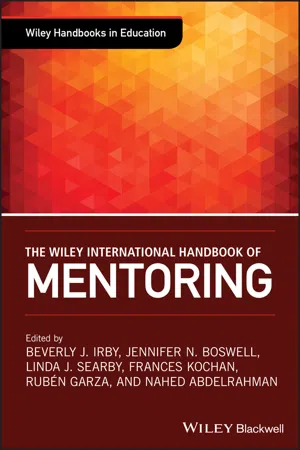
The Wiley International Handbook of Mentoring
- English
- ePUB (mobile friendly)
- Available on iOS & Android
The Wiley International Handbook of Mentoring
About this book
The first collection in the area of mentoring that applies theory to real-world practice, research, programs, and recommendations from an international perspective
In today's networked world society, mentoring is a crucial area for study that requires a deep international understanding for effective implementation. Despite the immense benefits of mentoring, current literature on this subject is surprisingly sparse. The Wiley International Handbook of Mentoring fills the need for a comprehensive volume of in-depth information on the different types of mentoring programs, effective mentoring practices, and emerging practical and applicable theories. Based on sound research methodologies, this unique text presents original essays by experts from over ten different countries, demonstrating the ways mentoring can make a difference in the workplace and in the classroom; these experts have an understanding of mentoring worldwide having worked in mentoring in over forty countries.
Each of the Handbook's four sections—mentoring paradigms, practices, programs, and possibilities—include a final synthesis chapter authored by the section editors that captures the essence of the lessons learned, applies a global context, and recommends research avenues for further exploration. This innovative volume demonstrates how mentoring in any culture can help employees to complete tasks and advance in their positions, aid in socialization and assimilation in various settings, provide diverse groups access to resources and information, navigate through personalities, politics, policies, and procedures, and much more.
- Offers an inclusive, international perspective that supports moving mentoring into a discipline of its own and lays a theoretical foundation for further research
- Shows how emerging practical theories can be implemented in actual programs and various scenarios
- Examines a wide range of contemporary paradigms, practices, and programs in the field of mentoring, including a panorama of introspections on mentoring from international scholars and practitioners
- Includes historical and epistemological content, background information and definitions, and overviews of fundamental aspects of mentoring
The Wiley International Handbook of Mentoring is an essential volume for a global readership, particularly teachers of mentoring courses, trainers, and researchers and practitioners in a variety of fields such as business, education, government, politics, sciences, industry, or sports.
Frequently asked questions
- Essential is ideal for learners and professionals who enjoy exploring a wide range of subjects. Access the Essential Library with 800,000+ trusted titles and best-sellers across business, personal growth, and the humanities. Includes unlimited reading time and Standard Read Aloud voice.
- Complete: Perfect for advanced learners and researchers needing full, unrestricted access. Unlock 1.4M+ books across hundreds of subjects, including academic and specialized titles. The Complete Plan also includes advanced features like Premium Read Aloud and Research Assistant.
Please note we cannot support devices running on iOS 13 and Android 7 or earlier. Learn more about using the app.
Information
Section I
Mentoring Paradigms
1
Defining Mentoring: An Elusive Search for Meaning and a Path for the Future
Purpose and Overview
Method
Rationale for a Creating a Definition of Mentoring
Table of contents
- Cover
- Table of Contents
- Preface
- Notes on Contributors
- Section I: Mentoring Paradigms
- Section II: Mentoring Practices
- Section III: Mentoring Programs
- Section IV: Mentoring Possibilities
- Index
- End User License Agreement